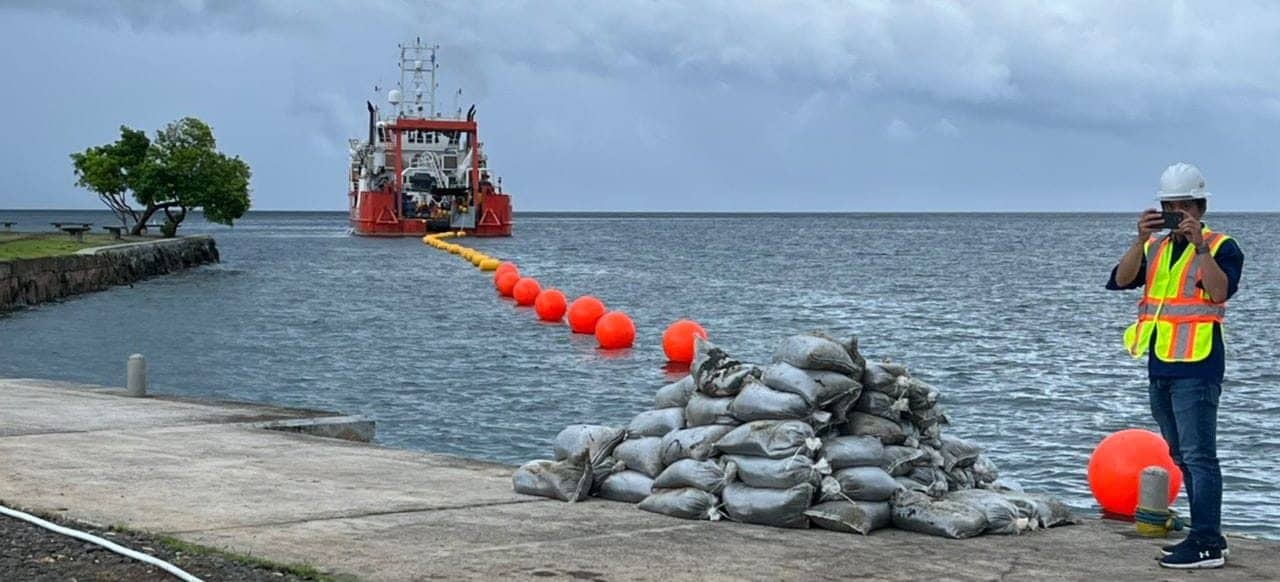Pacific nations are being warned against using Chinese technology to connect to Western-funded undersea cables or risk having access cut off on security grounds.
Nathaniel Fick, the U.S. envoy for cyberspace and digital policy, said the U.S. and its allies had learnt their lessons from the rush to buy Chinese-owned Huawei and ZTE networking systems, before discovering that the security of personal and state data could be compromised.
He said communications needed to be secured “end-to-end”, which meant there was no place for “untrusted” Chinese equipment such as onshore data centres that connected to the cables or towers in the system.
“We’re investing billions of dollars in ripping Huawei out of our networks, because I think there was a moment in time, a window in time when there was a hope that things might be different,” Fick told reporters in Sydney.
“And now there is accumulating evidence that makes very clear that these untrustworthy vendors and hardware are untrustworthy for a reason.
“And so, yes, anywhere this gear is deployed, it raises security issues. And it does then present a kind of a limit in terms of information sharing and collaboration in the digital domain.”
The rollout of undersea cables has become a major focus of the strategic competition between Western nations and China to gain influence in the Pacific.
Australia, Japan and the U.S last year pledged to co-fund a 2250-kilometre cable connecting the Federated States of Micronesia, Kiribati and Nauru. Australia and the U.S are also working with Google to build two trans-Pacific cables connecting Fiji and French Polynesia to the two continents, with the prospect of branching out to other Pacific nations.
Fick said the message to the Pacific islands and other strategic communications nodes such as Sri Lanka, Panama and Fiji was that being able to guarantee data security was key to developing modern information technology economies.
He said “codified legal agreements” between Beijing and companies such as Huawei meant data had to be handed over to the Chinese Communist Party.
This would mean a “limitation to information-sharing between those countries and our country and our allies and partners”.
“Every government in the world in 2024 aspires to develop an indigenous organic innovation ecosystem,” he said.
“[That] does increasingly depend upon the infrastructure being secure because the big global technology companies that are part of those innovation ecosystems are more and more reluctant to invest on the backbone of untrusted gear.”
Fick’s message came as Nauru’s president assured the Albanese government the tiny Pacific nation would remain closely aligned with Australia, a fortnight after abandoning Taiwan to establish diplomatic ties with China.
“We are deeply appreciative of the friendship that has flourished between Nauru and the Commonwealth of Australia,” President David Adeang said in front of an audience that included Pacific Minister Pat Conroy and Chinese diplomats during celebrations for Nauru’s Independence Day.
“Over the years our bonds have not only strengthened but also transformed into a profound mutual respect. We consider ourselves an integral part of the extended Australia family, and an indelible mark of Australia’s influence remains with us as our people, our cultures, and our futures become ever closer.”
In his private talks with Nauruan officials, Conroy offered assurances of his own regarding the Australian-funded immigration camp on Nauru after the Taiwanese government claimed Nauru’s flip was prompted by China’s willingness to fill a $125 million shortfall left by the scaling back of refugee processing.
“We have decades of defence and law enforcement co-operation, working together to meet Nauru’s security priorities,” Conroy said at the Independence Day event. “As Nauru’s largest development partner, we are investing in inclusive economic growth, sustainable infrastructure, jobs, skills and connectivity to ensure prosperity for communities now and for generations to come,” he said.
